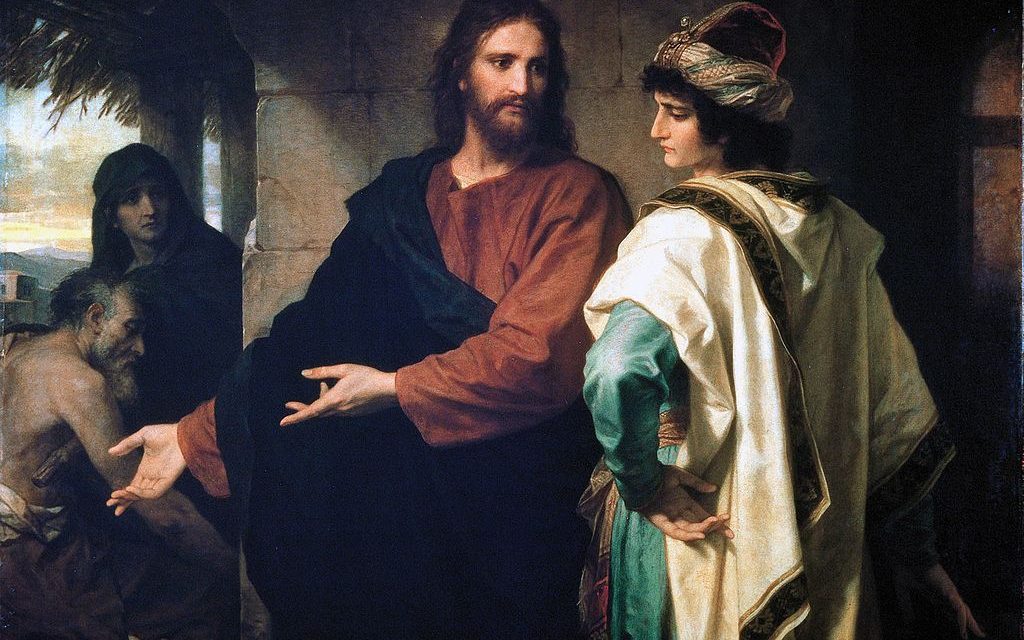Readings: Wisdom 7:7-11; Psalm 90:12-17; Hebrews 4:12-13; Mark 10:17-30
Discussions of gospel sayings about wealth tend to be a key moment when things “get real” in my core undergraduate theology classes. It begins to dawn on a critical mass of students that their current understanding of the Christian life might not line up with what the New Testament actually says about discipleship.
“But I heard there was a narrow ‘needle gate’ in Jerusalem. Doesn’t this mean that Jesus simply wants us to give away a few excess and unnecessary goods?” Sorry, friends. There is no evidence of such a gate ever having existed. Moreover, Jesus’s insistence on our need for God’s help in verse 27 would make a lot less sense if the “eye of the needle” image referred to a problem that can easily be resolved merely by human efforts. If you are surprised that even your favorite priest endorsed this theory in a homily, now may be a good time to reflect on just how deeply we all crave for ways of taming the gospel text.
“But what if the command on verse 21 only refers to what this particular rich man needs to do in order to follow Jesus and inherit eternal life? Can’t we allow for ‘vocational differences’ here so long as we are not attached to our possessions?” (Here one might point out that some followers of Jesus apparently got to keep their houses, e.g., at Lk 10:38-42 or Acts 18:2-3.) There is a grain of truth here. But not so fast! Notice that this passage is sandwiched inside a pivotal section (Mk 8:27-10:45) where the disciples’ understanding of Jesus’s messianic status must be radically and repeatedly corrected. The Son of Man will not take over Jerusalem through a violent revolution. As we hear for the third time and just after the “rich man” story, Jesus will be betrayed, mocked, tortured and killed (10:33-34). He “did not come to be served but to serve and to give his life as a ransom for many” (10:45). Disciples must walk the same path: “Whoever wishes to come after me must deny himself, take up his cross, and follow me. For whoever wishes to save his life will lose it, and whoever loses his life for my sake and that of the gospel will save it” (8:34-35).
So if Mk 10:21 can mean something different in the life of each disciple, it is also clear that each analogical application will have to be as serious and demanding as discipleship always is. It will always require everything from us. And we should expect to have a hard time distinguishing between the possessions we keep in service to the love of Christ and the possessions we keep because a part of us still wants to grasp for power over our lives and futures in the same way that the disciples wished for Jesus to grasp for power over Jerusalem. Money and possessions, after all, can be an excellent way to avoid being vulnerably dependent on God’s loving providence. If we do not want to pray (and live) Psalm 90 (or Mt 6:25-34, or Lk 12:22-34), Mammon will often appear to us as a perfect substitute.
Of course, even after these parameters are in place, we still face serious and difficult questions about what the faithful use of money and possessions looks like in our day and age. Our tradition has quite a lot to contribute here (e.g., about the universal destination of goods, the preferential option, etc.). But today I would like to see what this Sunday’s texts can themselves give us. Two points seem especially worth our attention:
I. As the text from Wisdom 7 reminds us, we need prudence. At one level the payoff here is obvious to any student of Aquinas’s moral theology: Rules cannot account for the full complexity of real life. We therefore need a habit that empowers us to engage in wise practical reasoning such that we can act here and now in a way that truly leads to our highest ends. Moreover, to say that I need prudence is to say that my intelligent and creative act of judgment between this and that way of pursuing God (=following Jesus) is not the sort of thing I can outsource to a computer.
If we’re honest, however, we must admit that Wisdom 7 does not seem particularly interested in these aspects of prudence. Instead, it emphasizes two things. First, prudence is principally a gift of God for which we must pray. Coming back to Mark 10, we might then say that we cannot separate the prudence we need to live out verse 21 from actually walking the path of discipleship and thereby receiving this wisdom from the Master himself.
Second, in Wisdom 7 prudence itself is worth far more than material wealth. The import of this may not be initially apparent to us. How often do we really find ourselves faced with a stark choice between becoming more prudent and becoming wealthier? As it turns out, the tradition has a good bit to say on how covetousness can prevent us from developing prudence. Greed can certainly teach us to nimbly discern effective means to ends—but not in such a way that is habitually directed where Jesus is actually going. Conversely, learning the prudence by which we can follow Jesus with our possessions may require from us a willingness to make choices that will not be endorsed by our financial advisors. This is especially the case when it comes to witnessing to the overabundant generosity of God’s love and the freedom from mere utility implied by membership in the family Jesus is gathering (see, e.g., all of Luke 15).
II. There is a nugget of “good news” that people often miss when talking about the “rich man” story. The story closes with a reminder that in giving up everything for the sake of Christ we sacrifice something of relatively less importance and gain the most important thing we could possibly seek. But earlier (in v. 21) the exchange was simply between earthly goods now and eternal life later: “sell what you have and give to the poor and you will have treasure in heaven” (see also Mt 6:20-21 or Lk 12:33-34). In verses 29-30, however, the exchange now comes with a reward in this life: “No one who has given up house or brothers or sisters or mother or father or children or lands for my sake…will not receive a hundred times more now in this present age.”
The exchange, in other words, is also an entrance into the family Jesus is gathering. It is precisely as members of that church, and in service to that whole family, that we see followers of Jesus using their homes in the New Testament. That is what the prodigal son’s brother cannot yet bring himself to do with the property his family still possesses (Lk 15:25-32). This is why there is no contradiction when Levi leaves “everything” behind to follow Jesus and then proceeds to throw “a great banquet for [Jesus] in his house” with “a large crowd of tax collectors” as guests (Lk 5:28-29). It is ‘prudent’ to give up everything now (even if we continue to ‘administer’ some of those possessions) because in doing so we already share in the first fruits of God’s reign.
It may seem out of place to emphasize this last point at a time when we are painfully aware of the depths of our Church’s brokenness and sinfulness. Nevertheless, I highlight this point as ‘good news’ for at least three reasons. First, as I learned by experience in my home parish in Athens, Georgia, such an ‘exchange’ can and does happen even in very broken parish communities. Second, to refuse to be silent about Mk 10:29-30 is also to preserve another way of naming just what is broken in our Church today. If we give up on that standard, we are also implying that we do not hope Jesus Christ will act, even now, to teach us how to use wealth in service to God’s reign. And finally, it may be that the spaces created by such generosity will be some of the best soil in which our Church’s renewal can grow. Without spaces that preserve a collective sense of our vulnerability before God and our mutual and joyful dependence as fellow prodigal children, I simply do not see how this reform process will have the steam and direction it needs to really address the problems at hand.



